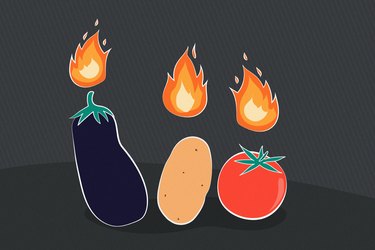
Most of us know to incorporate fruits and vegetables into our diet — they're the gold standard when it comes to food that fuels good health. However, one group of produce called nightshades has actually been linked to having the opposite effect on your health by triggering inflammation. But is this weighty accusation actually a cause for concern?
First of All, What Are Nightshades?
Crops that come from a family of flowering plants in the Solanaceae family are considered nightshades. They grow in various forms, most notably herbs and spices, tubers, vines shrubs and trees.
Video of the Day
Common nightshade vegetables include:
- Peppers (including hot, bell and chilis)
- White potatoes (sweet potatoes and yams are not in the nightshade family)
- Tomatoes
- Tomatillos
- Eggplant
- Tobacco
All of the Solanaceae plants can produce a substance known as solanine, a type of alkaloid that can be poisonous or toxic when consumed in higher amounts. "Some members of this plant family also produce other alkaloid compounds that are highly poisonous, and these plants are not edible at all," Suzanne Dixon, RD and epidemiologist, tells LIVESTRONG.com.
Some nightshades can even turn toxic to a degree, such as when a white potato starts to rot and turn a greenish hue. With most other nightshade vegetables, however, it's quite difficult to determine whether they've produced more solanine than the mere trace amounts typically found in these foods.
The Benefits of Eating Nightshade Vegetables
Although they've gotten a bad rap in recent years, nightshades contain phytonutrients that are linked with many health benefits. Most nightshades also contain minerals, vitamins and anti-inflammatory and antioxidant substances.
1. They're a Source of Fiber
The American Heart Association (AHA) recommends getting at least 25 grams of fiber for every 2,000 calories you eat. However, many of us are falling short on this gut-friendly nutrient.
Adding nightshades to your diet can help boost your fiber intake and help feed a healthy microbiome, Dixon says. One cup of raw eggplant contain 2.5 grams of fiber, which is about 10 percent of your daily value (DV), while one cup of raw tomatoes contains 2.2 grams (9 percent of your DV), one baked white potato contains 2.1 grams (8 percent of your DV) and one cup of red bell peppers contain 3.1 grams (13 percent of your DV).
High-fiber foods are linked to reducing the risk of gastrointestinal-related conditions including constipation, IBS, colitis, colon polyps and GI tract cancers, particularly colon cancer, according to July 2013 research in Gastroenterology. What's more, fiber can also help you lose weight since it takes longer to digest, keeping you fuller for longer, per the AHA.
2. They Contain Protective Antioxidants
But perhaps the nutrient tomatoes are most prized for is lycopene, a carotenoid that gives red fruits and veggies their hue.
December 2013 research in Annual Review of Food Science and Technology suggests it plays a role in reducing the risk of heart disease and some types of cancer. And a meta-analysis of 14 studies found that lycopene intake was associated with a 17 percent lower risk of heart disease and stroke, per September 2017 research in Molecular Nutrition & Food Research.
Red bell peppers contain some lycopene, but not nearly as much as tomatoes. What's more, cooking the red fruits and veggies helps boost the lycopene's bioavailability, so your body will better absorb the nutrient via cooked peppers or marinara sauce, Dixon says.
Eggplant is another nightshade vegetable that boasts many health benefits, specifically in its dark purple skin. "The skin contains anthocyanins, which belong to the flavonoid group of phytonutrient [antioxidant] compounds," says Dixon. "A diet rich in anthocyanins also is linked with lower rates of several types of chronic disease."
3. They Pack in Plenty of Vitamins and Nutrients
Tomatoes are a solid source of potassium, boasting 11 percent of your DV per cup. But potatoes have even more, with 35 percent of our daily needs in just one baked tuber.
Tomatoes, potatoes and bell peppers also contain a significant amount of immune-boosting vitamin C: Tomatoes pack in 27 percent DV while potatoes contain 42 percent of your DV and bell peppers take the cake with 211 percent. These veggies also provide some vitamin K, which helps your blood clot when you get a cut and plays a significant role in bone metabolism, per the National Institutes of Health.
Who Shouldn't Eat Nightshades

For most people, nightshades can definitely be included as part of a healthy diet. However, those who have a compromised immune system, an autoimmune disease, inflammatory bowel disease (IBD) or other digestive issues might notice that eating these fruits and veggies can worsen their symptoms, says Roger Adams, PhD, a Houston-based certified sports nutritionist and founder of Eat Right Fitness.
"The existing research on avoiding nightshades is mostly in test tubes or in animals; but there are some preliminary findings that suggest people with certain inflammatory conditions (and overactive immune systems) might benefit from avoiding these fruits and veggies."
"While most of these issues have to do with the solanine found in nightshades, most of the solanine lies mainly in the foliage, stems and vines rather than the edible parts," he says. People who fall into the camps above, though, may be sensitive even to the small amounts of solanine found in nightshades' edible portions.
That's because some research suggests the small amounts of alkaloids in the edible portions that could trigger inflammation in certain individuals. "The existing research on avoiding nightshades is mostly in test tubes or in animals; but there are some preliminary findings that suggest people with certain inflammatory conditions (and overactive immune systems) might benefit from avoiding these fruits and veggies," he says.
"In animal models, alkaloids have shown to negatively affect intestinal permeability (aka, cause "leaky gut") and increase inflammation, which simply means that in these models, nightshades affect the absorption of foods through the intestinal wall," he adds. In fact, a small November 2017 study suggests that certain people with IBD might benefit from avoiding nightshades, per research in Inflammatory Bowel Diseases.
If you have an autoimmune disease that makes you more sensitive to nightshades, you can instead focus on the many other healthy, colorful vegetables and fruit that do not fall in this family. "Literally any other vegetables can be helpful," notes Dixon. "You can replace starchy nightshades with similar non-nightshade options. For example, eat sweet potato instead of white potato," she says. And incoportate more non-starchy vegetables like leafy greens, asparagus and Brussels sprouts in your diet.
Related Reading
The Verdict on Nightshades
The majority of us shouldn't be concerned about nightshades — there just isn't enough compelling evidence that says people without autoimmune diseases should avoid them.
In fact, Dixon points out that research suggests that many vegetables (including broccoli, cauliflower and kale) produce substances that would be toxic in large amounts, but when eaten as part of a normal healthy diet, can actually improve health, per a February 2012 study in the Journal of Biomedicine and Biotechnology.
"Even water can be toxic if you drink too much of it," Dixon says. "In this sense, all of the beneficial aspects of nightshades (antioxidants, vitamins, minerals and fiber) outweigh the drawbacks."
Still, if you have an autoimmune disease, cutting out nightshades for at least a month and tracking your symptoms can help you decide if these foods are something you need to avoid permanently.
Related Reading
- Molecular Nutrition & Food Research: “Lycopene and Risk of Cardiovascular Diseases: a Meta-Analysis of Observational Studies”
- Journal of Biomedicine and Biotechnology: "The Safety of Cruciferous Plants in Humans: A Systematic Review"
- USDA: "Eggplant"
- USDA: "Baked Potato"
- USDA: "Tomatoes"
- USDA: "Red Bell Peppers"
- National Institutes of Health: "Vitamin K"
- AHA: "Fiber Up, Slim Down"
- AHA: "Whole Grains and Fiber"
